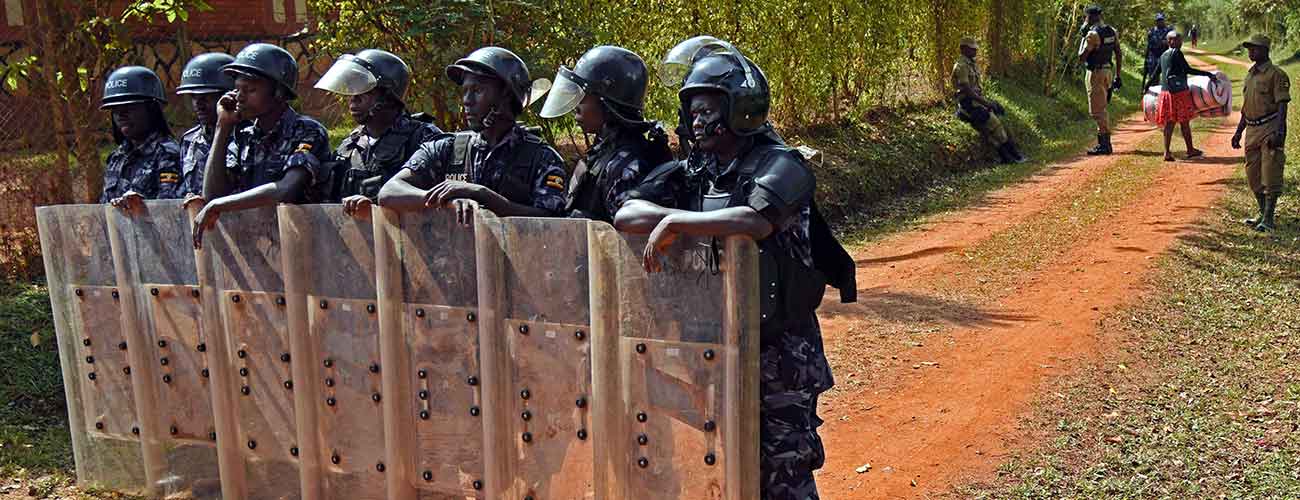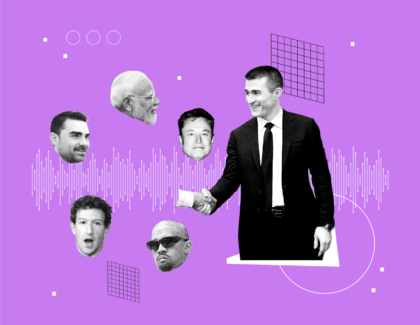Sign up for the daily CJR newsletter.
KAMPALA, Uganda–The night before Uganda’s February 18 presidential vote, David Tumusiime went to bed with a firm plan in place for the next day’s coverage. The website editor for Uganda Radio Network (URN), a syndicate of more than 20 correspondents spread across the East African country, Tumusiime had set up a WhatsApp group to collect video clips and audio reports from his team. Then he would use URN’s Facebook page and Twitter feed to share that information with the news organization’s thousands of followers.
But there was a hitch. When he woke up on Election Day, someone had turned off the country’s social media.
At first Tumusiime didn’t realize anything was wrong. “We have unreliable networks in Uganda,” he says. “So I thought it was an individual problem. I didn’t think it was an organized clampdown until I called a few colleagues and they told me they couldn’t communicate with our WhatsApp group.”
The government acknowledged in the days after the election it had ordered the Uganda Communications Commission (UCC) to shut down all access to social media sites for three days, including Facebook, WhatsApp, and Twitter, over alleged security threats. Officials worried that the opposition planned to use social media to disrupt the balloting process and possibly spur violence when results were announced within 48 hours of the vote.
The move threw the media into disarray, at least initially. In a country where social networks are becoming increasingly intrinsic–not just to disseminating news, but also to gathering it–the blackout substantively reduced early coverage as Ugandans went to the polls.
At URN, Tumusiime said the morning quickly devolved into “trial and error” as members of the team tried to figure out how to stay in touch with each other. By the end of the day, most URN reporters, like much of the rest of Uganda’s media fraternity and tens of thousands of ordinary citizens across the country, had managed to download virtual private networks (VPNs) for their phones and computers, allowing them to set up secure internet connections and access social media sites.
Still, the disruption left people across the country confused and wary about what they might have missed in the hours they’d spent offline.
“We couldn’t see what was happening,” says Kelly Daniel Mukwano, the executive director of iFreedom Uganda Network, a digital rights watchdog. “We couldn’t interact with people from other areas. We couldn’t read news.”
More worryingly, journalists are interpreting the move as a signal that social media has become a new front in the longstanding battle between Uganda’s government and its newsrooms. The state under President Yoweri Museveni, now 30 years in office, has long been quick to shutter media houses and revoke radio licenses when reporting threatens the perceived stability of his regime. There are regular allegations of police officers and even ministers attacking reporters. And the government routinely co-opts its chief media critics with plum positions inside the administration. Disrupting social media, journalists say, is the government’s latest tactic to control the national narrative, and potentially one of its most effective.
Social media sites are having an outsized impact on the country’s news agenda, according to Robert Sempala, the national coordinator for the Human Rights Network for Journalists – Uganda (HRNJ Uganda). WhatsApp and Facebook messaging are much cheaper than standard text messages or pay-per-use internet packages for computers, especially for roving reporters trying to stay in touch with editors and transmit photos and short audio and video files. The sites have also become hotlines for sharing news tips and leaking documents, Sempala says. Twitter and Facebook are critical for news organizations looking to quickly share breaking news.
“Social media, of late, has been playing a very pivotal role in shaping the news agenda in Uganda,” he says. “Shutting it down has a very big drawback to the flow of information.”
Election Day in Uganda was already set to be tense. The incumbent, Museveni, attempting to add another five-year term to his rule, was running against his former Prime Minister Amama Mbabazi and a longtime opposition leader, Kizza Besigye, among others.
Besigye had actually been arrested and then released the day before the poll, and rumors were swirling on private WhatsApp groups of possible Election Day violence. A day before the vote, Kale Kayihura, the inspector general of police, showed up at an Electoral Commission press conference to warn journalists about repeating these rumors.
“Social media has become so pervasive,” he said at the press conference. “A lot of negativity, lies, are being beamed down. It creates unnecessary tension. Controlling social media is not easy.” His comments assumed greater significance after the UCC executive director issued a sworn affidavit saying that it was Kayihura who directed him to turn off the country’s social media.
Shutting down social media is nothing new. Governments from China to Turkey have attempted to black out such sites, with varying degrees of success. But given Uganda’s still-limited internet access and other Election Day concerns, the government’s worries about social media were unexpected. The UCC estimates about 13 million people used the internet during the last fiscal year, primarily in Kampala and other major towns–a 37 percent penetration rate.
Those users’ online behavior, though, may justify the government’s worries. Research on internet usage in East Africa is limited, but a 2015 study among 60 Ugandan policymakers and media professionals found 78 percent use WhatsApp daily. Sixty-nine percent used Facebook every day, and 49 percent Twitter.
In recognition of social media’s growing significance, telecommunications companies like India-based Airtel are now offering users in Uganda unlimited access to WhatsApp, Twitter, and Facebook for the equivalent of 15 cents per day.
“The majority of our population are youth and they’re using social media,” says iFreedom’s Mukwano. “I think social media is the No. 1 arm people are using to access information.” So it was no surprise to him, at least, when the networks went down in the hours before voting started. But he still worries about the implications: “This could mean worse for the future of the free media in this country.”
Though Uganda’s journalists enjoy relative freedom compared to colleagues in neighboring countries like Rwanda and Ethiopia, Museveni’s government has been quick to crack down on the media during times of political tension. In late 2009, for instance, following two days of riots in a Kampala neighborhood, the government suspended the licenses of three radio stations and withdrew that of a fourth.
The government’s efforts to restrict the press up to and even after the February vote, Sempala says, were unprecedented. His organization has recorded more than 100 media violations since October of last year, including the near-daily arrests of journalists attempting to cover Besigye, who was under house arrest for more than a month after Museveni was officially declared the winner of the ballot. (He was finally released in early April, only to be re-arrested several times since.) The incidents in the five months running up to the vote, Sempala says, outnumbered those that occurred during the first nine months of 2015 combined. And while not as blunt as arresting a reporter or seizing equipment, he says the social media blackout was in keeping with this recent string of events.
In media circles, there is still some debate over how effective it was. Frank Kisakye is the Web editor for The Observer, one of the country’s leading independent papers. He describes himself as a “one-man team online,” posting breaking news to the paper’s Twitter account, more conversational posts on its Facebook page, and stories to the website.
In the hours after the social media blackout began, he noticed something unusual: a spike in traffic to The Observer’s Twitter account. Not only were people figuring out how to circumvent the blackout, they were eager to talk about it.
“Hide information from people and they will start looking for it more,” he says. In the three days that social media platforms remained down, “there was a lot of interactivity” from people looking for updates on any problems at the polls or in the vote counting.
The blackout also offered both journalists and their audiences an unexpected lesson in cybersecurity, which Kisakye says would make it difficult for the government to attempt a similar shutdown in the future. “Now people know, ‘Okay, if I need to mask my identity, my location, this is how I do it,’” he says. “I think they blundered.”
Abby Mukiibi, the programs manager for CBS FM radio in Kampala, is not so sure.
“It did cripple a lot of what we were supposed to do,” he says. “Not every correspondent, not every journalist you could talk to had access to VPN.” It also heightened fears of rigging and possible riots–fears the media was unable to confirm or tamp down.
The shutdown didn’t just make it difficult for journalists to transmit information, it also left some reporters vulnerable. Scribes who could not access VPNs and innocuously send information over Facebook or WhatsApp were wary of using their cellphones to call in any problems they saw at polling stations out of fear that Museveni supporters might attack them, Sempala says. As a result, he suspects many voting-day irregularities went unreported.
Meanwhile, the 40 observers HRNJ Uganda had deployed throughout the country to monitor reporter safety and access were unable to do their jobs. Their monitoring activities–ensuring reporters were allowed into polling stations and that they weren’t harassed by electoral officials–were supposed to be reported over WhatsApp.
Whatever their perception of the impact on the election, which Museveni officially won with 60 percent of the vote, the media fraternity is convinced the shutdown was only the government’s opening effort to control social media.
In mid-March the regime tried to amend the 2013 Communications Act. The suggested changes would remove parliamentary oversight of the administration’s attempts to regulate social media and the people who use it. The government is defending the move on the same security grounds as the Election Day blackout. iFreedom’s Mukwano sees something more insidious.
“They are trying to build a fence around the entire internet and social media.”
Has America ever needed a media defender more than now? Help us by joining CJR today.







